An Analysis of Accounting Ethics: Codes of Ethics and Practice
VerifiedAdded on 2020/10/22
|10
|2647
|143
Essay
AI Summary
This essay delves into the realm of accounting ethics, focusing on the code of ethics and the code of practice. It begins by defining accounting ethics and highlighting their importance in maintaining public trust and ensuring fair financial reporting. The essay then explores the similarities and differences between the code of ethics, which emphasizes principles like integrity and objectivity, and the code of practice, which provides guidelines for professional conduct. The justification for both codes is presented, including the application of the social contract theory and classical management theory to support ethical practices and organizational structure. Finally, the essay assesses the likelihood of success for both codes, emphasizing their role in preventing fraud, ensuring accurate financial statements, and promoting ethical decision-making within organizations. The essay underscores the significance of these codes in fostering transparency, accountability, and overall success in the accounting profession.
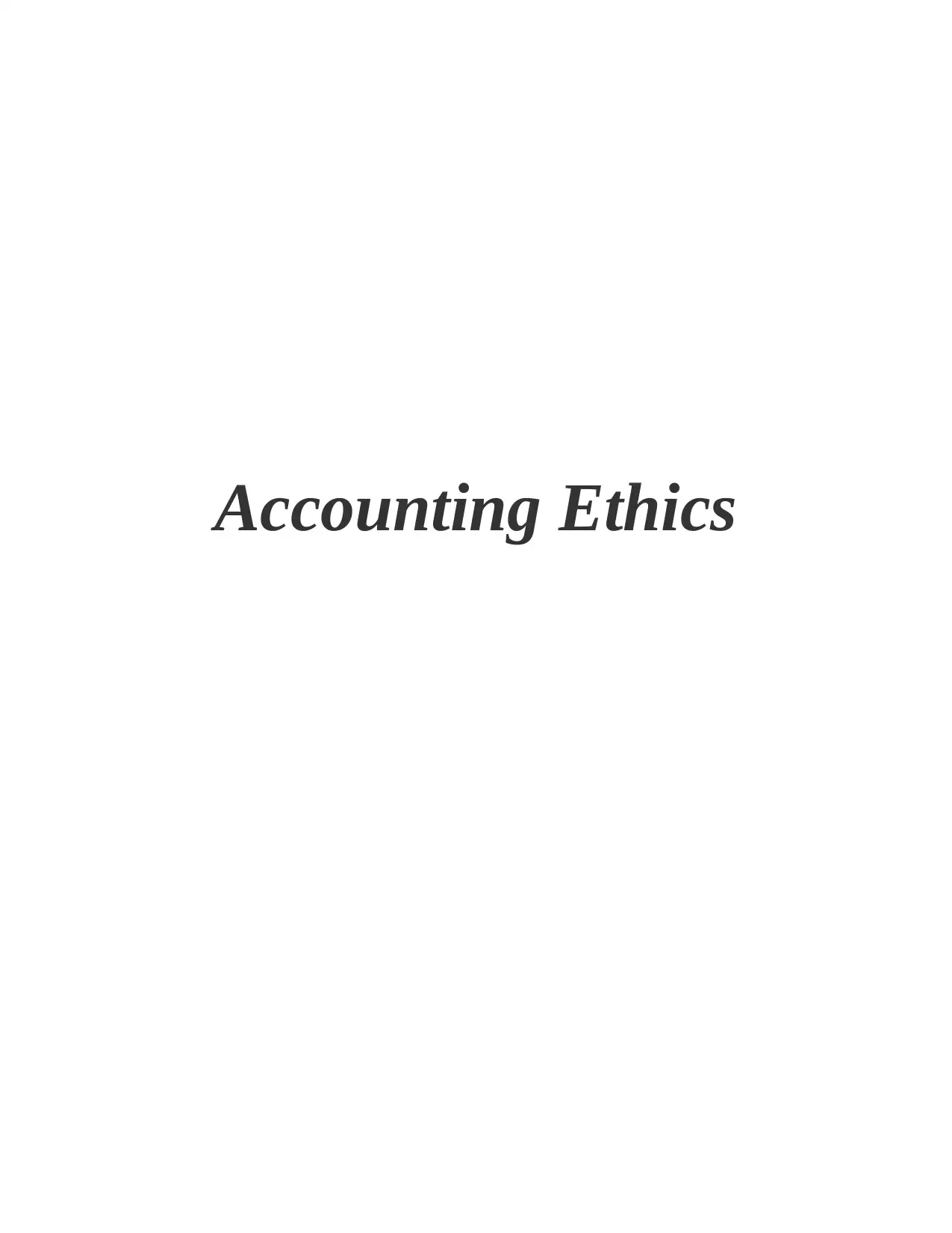
Accounting Ethics
Paraphrase This Document
Need a fresh take? Get an instant paraphrase of this document with our AI Paraphraser
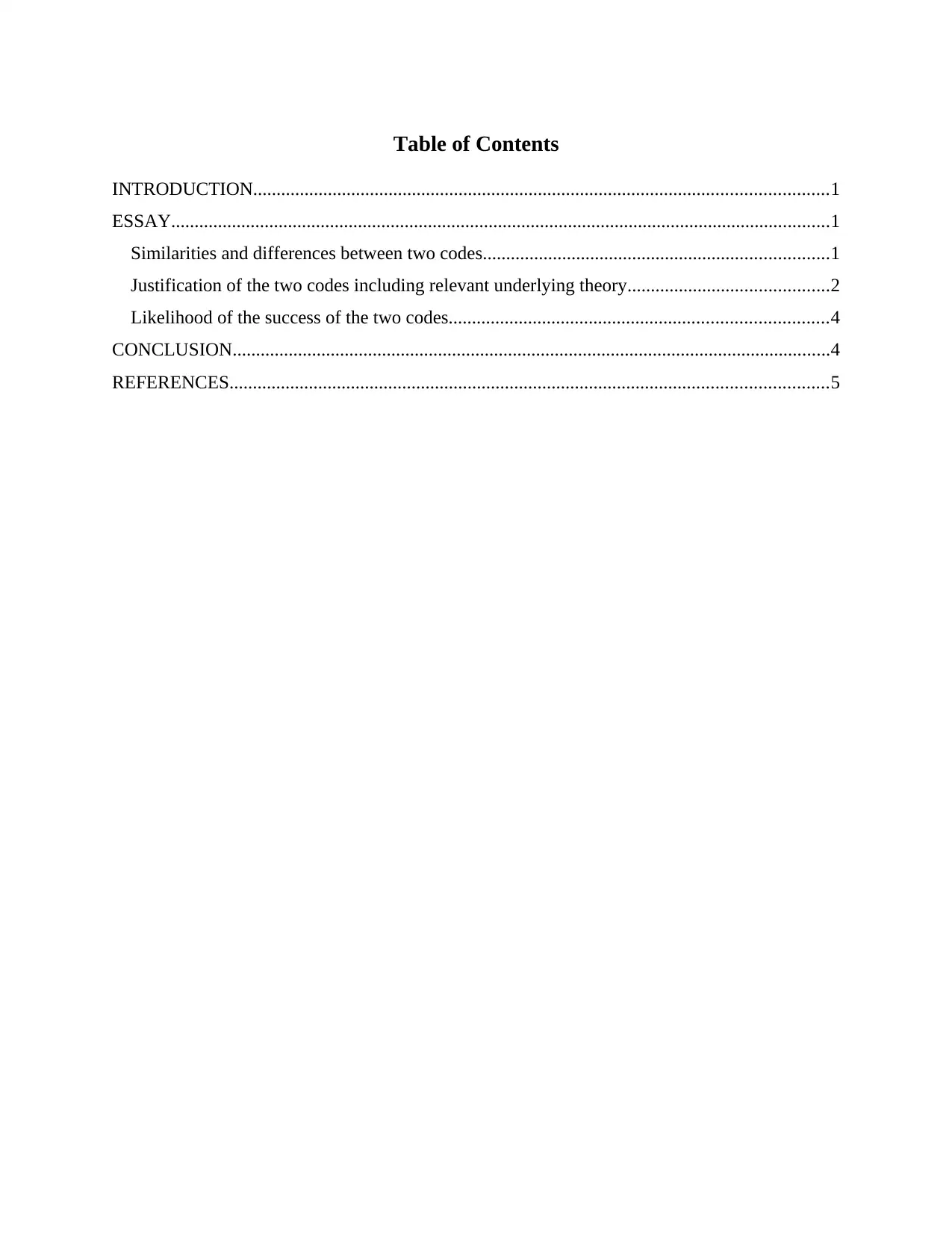
Table of Contents
INTRODUCTION...........................................................................................................................1
ESSAY.............................................................................................................................................1
Similarities and differences between two codes..........................................................................1
Justification of the two codes including relevant underlying theory...........................................2
Likelihood of the success of the two codes.................................................................................4
CONCLUSION................................................................................................................................4
REFERENCES................................................................................................................................5
INTRODUCTION...........................................................................................................................1
ESSAY.............................................................................................................................................1
Similarities and differences between two codes..........................................................................1
Justification of the two codes including relevant underlying theory...........................................2
Likelihood of the success of the two codes.................................................................................4
CONCLUSION................................................................................................................................4
REFERENCES................................................................................................................................5

⊘ This is a preview!⊘
Do you want full access?
Subscribe today to unlock all pages.

Trusted by 1+ million students worldwide
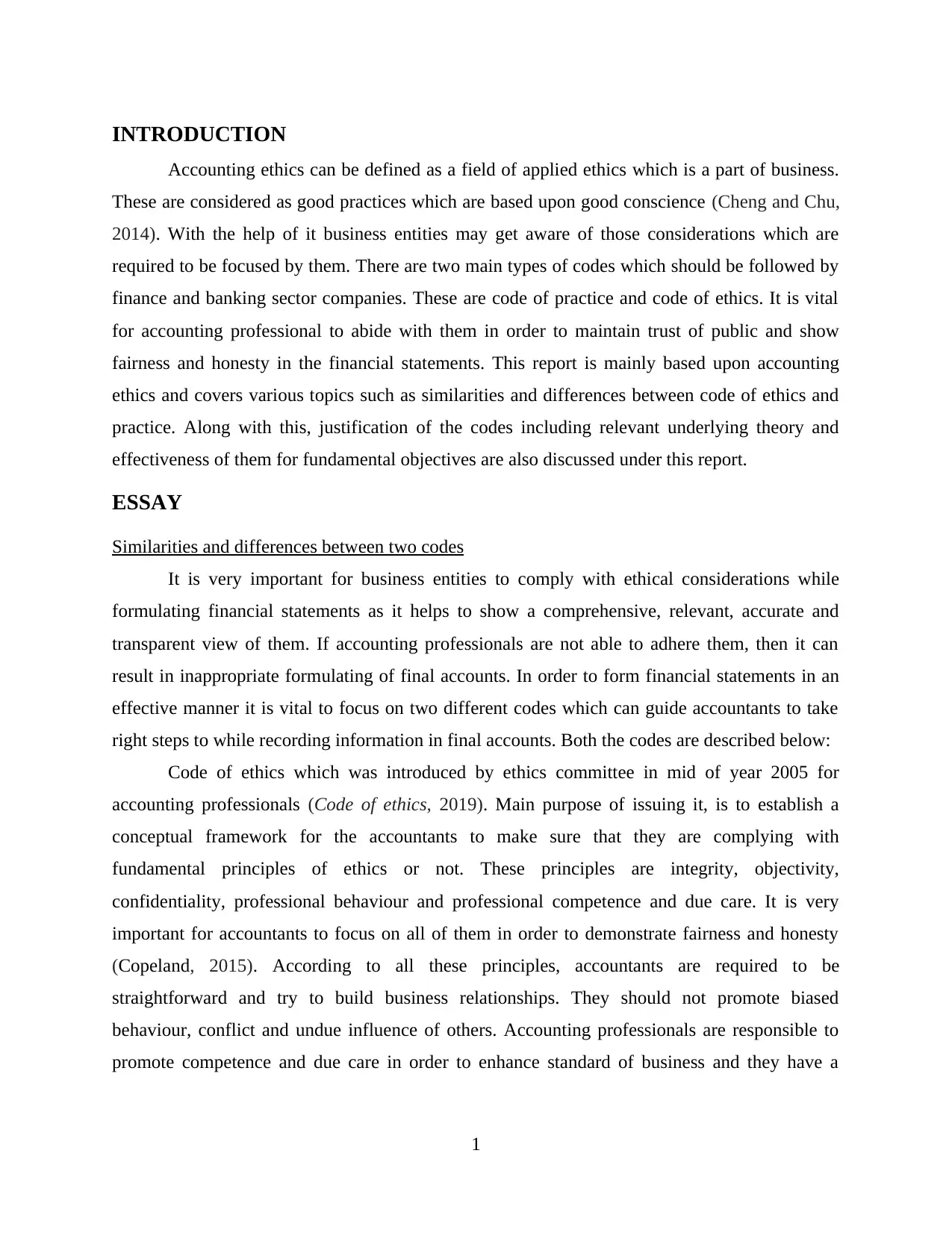
INTRODUCTION
Accounting ethics can be defined as a field of applied ethics which is a part of business.
These are considered as good practices which are based upon good conscience (Cheng and Chu,
2014). With the help of it business entities may get aware of those considerations which are
required to be focused by them. There are two main types of codes which should be followed by
finance and banking sector companies. These are code of practice and code of ethics. It is vital
for accounting professional to abide with them in order to maintain trust of public and show
fairness and honesty in the financial statements. This report is mainly based upon accounting
ethics and covers various topics such as similarities and differences between code of ethics and
practice. Along with this, justification of the codes including relevant underlying theory and
effectiveness of them for fundamental objectives are also discussed under this report.
ESSAY
Similarities and differences between two codes
It is very important for business entities to comply with ethical considerations while
formulating financial statements as it helps to show a comprehensive, relevant, accurate and
transparent view of them. If accounting professionals are not able to adhere them, then it can
result in inappropriate formulating of final accounts. In order to form financial statements in an
effective manner it is vital to focus on two different codes which can guide accountants to take
right steps to while recording information in final accounts. Both the codes are described below:
Code of ethics which was introduced by ethics committee in mid of year 2005 for
accounting professionals (Code of ethics, 2019). Main purpose of issuing it, is to establish a
conceptual framework for the accountants to make sure that they are complying with
fundamental principles of ethics or not. These principles are integrity, objectivity,
confidentiality, professional behaviour and professional competence and due care. It is very
important for accountants to focus on all of them in order to demonstrate fairness and honesty
(Copeland, 2015). According to all these principles, accountants are required to be
straightforward and try to build business relationships. They should not promote biased
behaviour, conflict and undue influence of others. Accounting professionals are responsible to
promote competence and due care in order to enhance standard of business and they have a
1
Accounting ethics can be defined as a field of applied ethics which is a part of business.
These are considered as good practices which are based upon good conscience (Cheng and Chu,
2014). With the help of it business entities may get aware of those considerations which are
required to be focused by them. There are two main types of codes which should be followed by
finance and banking sector companies. These are code of practice and code of ethics. It is vital
for accounting professional to abide with them in order to maintain trust of public and show
fairness and honesty in the financial statements. This report is mainly based upon accounting
ethics and covers various topics such as similarities and differences between code of ethics and
practice. Along with this, justification of the codes including relevant underlying theory and
effectiveness of them for fundamental objectives are also discussed under this report.
ESSAY
Similarities and differences between two codes
It is very important for business entities to comply with ethical considerations while
formulating financial statements as it helps to show a comprehensive, relevant, accurate and
transparent view of them. If accounting professionals are not able to adhere them, then it can
result in inappropriate formulating of final accounts. In order to form financial statements in an
effective manner it is vital to focus on two different codes which can guide accountants to take
right steps to while recording information in final accounts. Both the codes are described below:
Code of ethics which was introduced by ethics committee in mid of year 2005 for
accounting professionals (Code of ethics, 2019). Main purpose of issuing it, is to establish a
conceptual framework for the accountants to make sure that they are complying with
fundamental principles of ethics or not. These principles are integrity, objectivity,
confidentiality, professional behaviour and professional competence and due care. It is very
important for accountants to focus on all of them in order to demonstrate fairness and honesty
(Copeland, 2015). According to all these principles, accountants are required to be
straightforward and try to build business relationships. They should not promote biased
behaviour, conflict and undue influence of others. Accounting professionals are responsible to
promote competence and due care in order to enhance standard of business and they have a
1
Paraphrase This Document
Need a fresh take? Get an instant paraphrase of this document with our AI Paraphraser
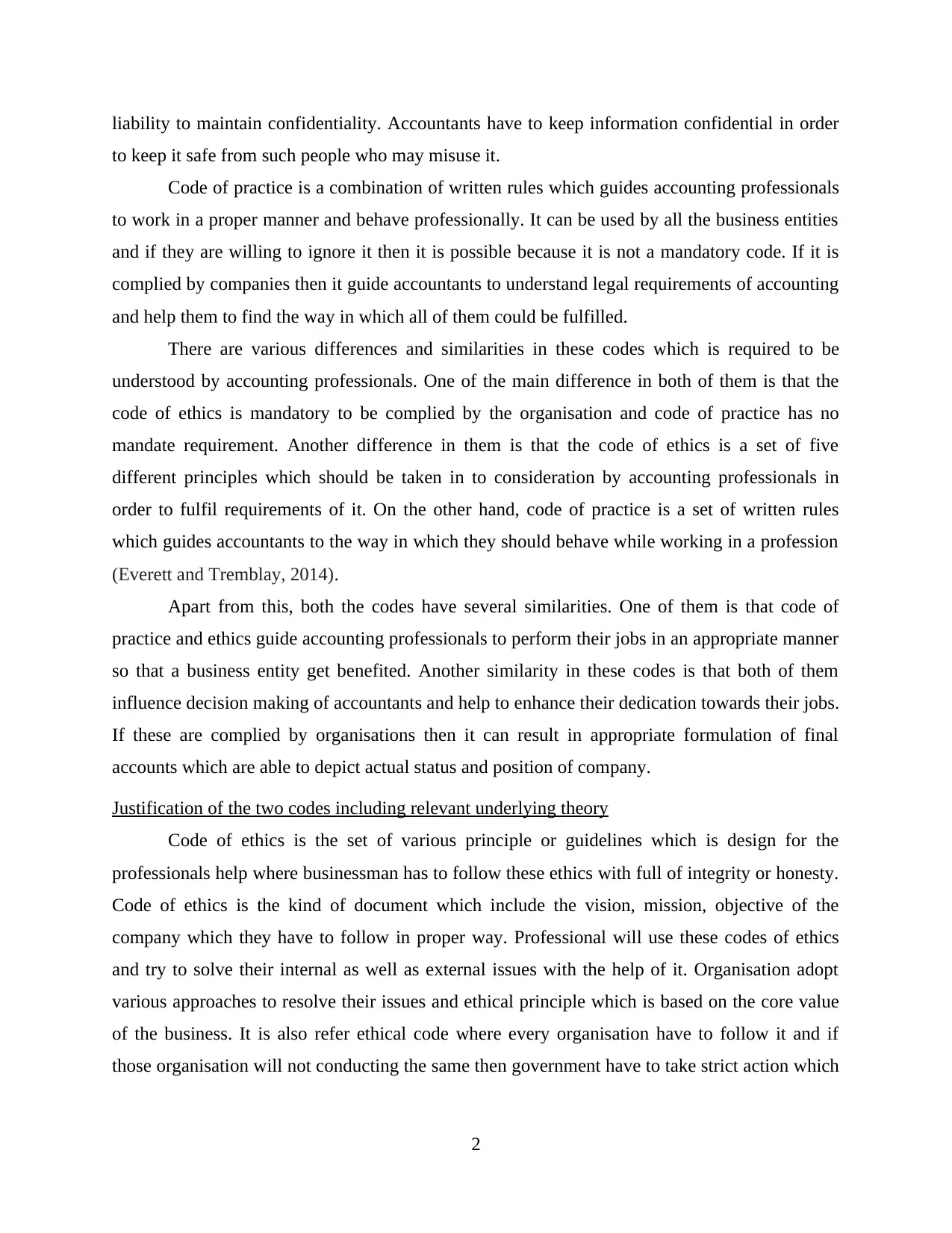
liability to maintain confidentiality. Accountants have to keep information confidential in order
to keep it safe from such people who may misuse it.
Code of practice is a combination of written rules which guides accounting professionals
to work in a proper manner and behave professionally. It can be used by all the business entities
and if they are willing to ignore it then it is possible because it is not a mandatory code. If it is
complied by companies then it guide accountants to understand legal requirements of accounting
and help them to find the way in which all of them could be fulfilled.
There are various differences and similarities in these codes which is required to be
understood by accounting professionals. One of the main difference in both of them is that the
code of ethics is mandatory to be complied by the organisation and code of practice has no
mandate requirement. Another difference in them is that the code of ethics is a set of five
different principles which should be taken in to consideration by accounting professionals in
order to fulfil requirements of it. On the other hand, code of practice is a set of written rules
which guides accountants to the way in which they should behave while working in a profession
(Everett and Tremblay, 2014).
Apart from this, both the codes have several similarities. One of them is that code of
practice and ethics guide accounting professionals to perform their jobs in an appropriate manner
so that a business entity get benefited. Another similarity in these codes is that both of them
influence decision making of accountants and help to enhance their dedication towards their jobs.
If these are complied by organisations then it can result in appropriate formulation of final
accounts which are able to depict actual status and position of company.
Justification of the two codes including relevant underlying theory
Code of ethics is the set of various principle or guidelines which is design for the
professionals help where businessman has to follow these ethics with full of integrity or honesty.
Code of ethics is the kind of document which include the vision, mission, objective of the
company which they have to follow in proper way. Professional will use these codes of ethics
and try to solve their internal as well as external issues with the help of it. Organisation adopt
various approaches to resolve their issues and ethical principle which is based on the core value
of the business. It is also refer ethical code where every organisation have to follow it and if
those organisation will not conducting the same then government have to take strict action which
2
to keep it safe from such people who may misuse it.
Code of practice is a combination of written rules which guides accounting professionals
to work in a proper manner and behave professionally. It can be used by all the business entities
and if they are willing to ignore it then it is possible because it is not a mandatory code. If it is
complied by companies then it guide accountants to understand legal requirements of accounting
and help them to find the way in which all of them could be fulfilled.
There are various differences and similarities in these codes which is required to be
understood by accounting professionals. One of the main difference in both of them is that the
code of ethics is mandatory to be complied by the organisation and code of practice has no
mandate requirement. Another difference in them is that the code of ethics is a set of five
different principles which should be taken in to consideration by accounting professionals in
order to fulfil requirements of it. On the other hand, code of practice is a set of written rules
which guides accountants to the way in which they should behave while working in a profession
(Everett and Tremblay, 2014).
Apart from this, both the codes have several similarities. One of them is that code of
practice and ethics guide accounting professionals to perform their jobs in an appropriate manner
so that a business entity get benefited. Another similarity in these codes is that both of them
influence decision making of accountants and help to enhance their dedication towards their jobs.
If these are complied by organisations then it can result in appropriate formulation of final
accounts which are able to depict actual status and position of company.
Justification of the two codes including relevant underlying theory
Code of ethics is the set of various principle or guidelines which is design for the
professionals help where businessman has to follow these ethics with full of integrity or honesty.
Code of ethics is the kind of document which include the vision, mission, objective of the
company which they have to follow in proper way. Professional will use these codes of ethics
and try to solve their internal as well as external issues with the help of it. Organisation adopt
various approaches to resolve their issues and ethical principle which is based on the core value
of the business. It is also refer ethical code where every organisation have to follow it and if
those organisation will not conducting the same then government have to take strict action which
2
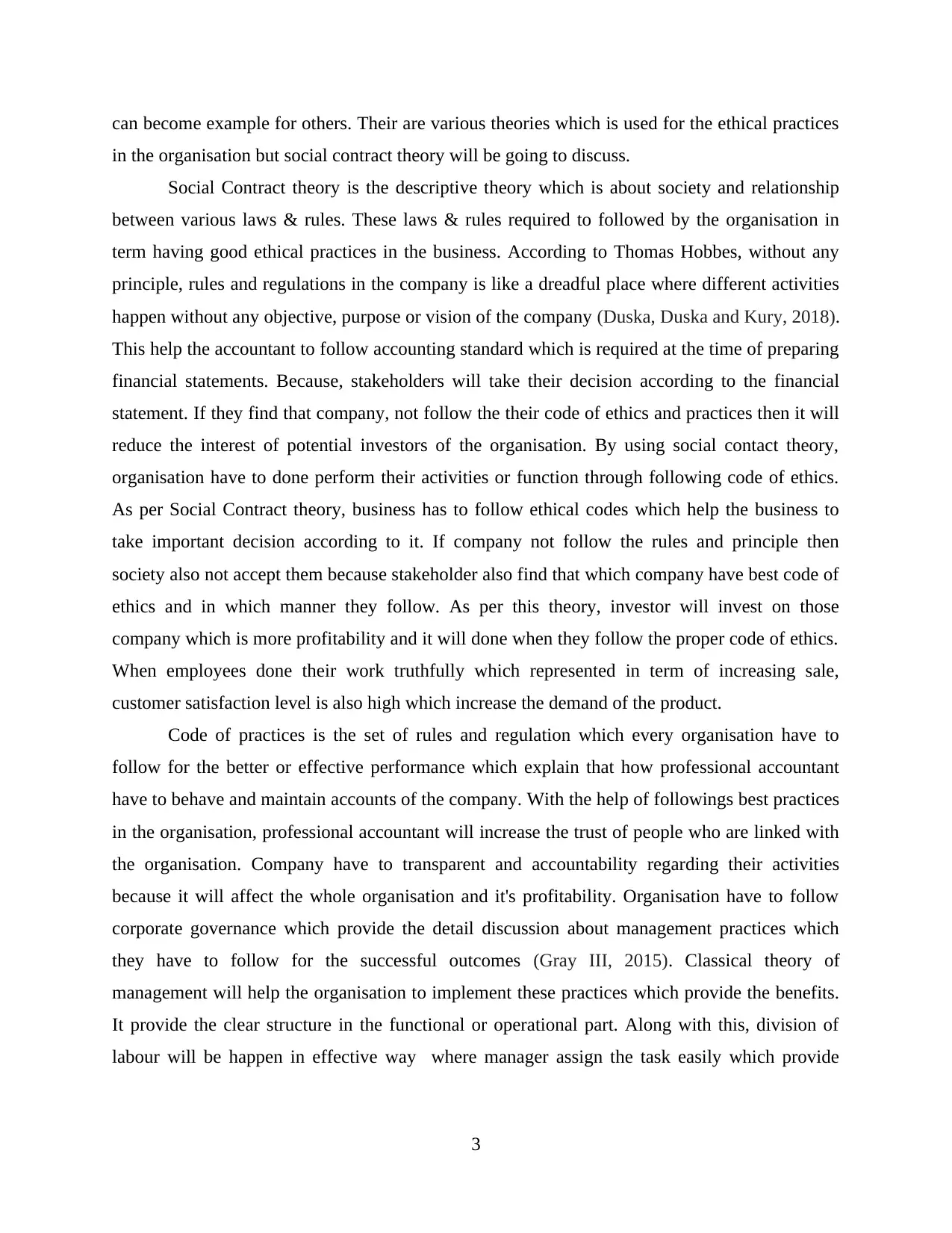
can become example for others. Their are various theories which is used for the ethical practices
in the organisation but social contract theory will be going to discuss.
Social Contract theory is the descriptive theory which is about society and relationship
between various laws & rules. These laws & rules required to followed by the organisation in
term having good ethical practices in the business. According to Thomas Hobbes, without any
principle, rules and regulations in the company is like a dreadful place where different activities
happen without any objective, purpose or vision of the company (Duska, Duska and Kury, 2018).
This help the accountant to follow accounting standard which is required at the time of preparing
financial statements. Because, stakeholders will take their decision according to the financial
statement. If they find that company, not follow the their code of ethics and practices then it will
reduce the interest of potential investors of the organisation. By using social contact theory,
organisation have to done perform their activities or function through following code of ethics.
As per Social Contract theory, business has to follow ethical codes which help the business to
take important decision according to it. If company not follow the rules and principle then
society also not accept them because stakeholder also find that which company have best code of
ethics and in which manner they follow. As per this theory, investor will invest on those
company which is more profitability and it will done when they follow the proper code of ethics.
When employees done their work truthfully which represented in term of increasing sale,
customer satisfaction level is also high which increase the demand of the product.
Code of practices is the set of rules and regulation which every organisation have to
follow for the better or effective performance which explain that how professional accountant
have to behave and maintain accounts of the company. With the help of followings best practices
in the organisation, professional accountant will increase the trust of people who are linked with
the organisation. Company have to transparent and accountability regarding their activities
because it will affect the whole organisation and it's profitability. Organisation have to follow
corporate governance which provide the detail discussion about management practices which
they have to follow for the successful outcomes (Gray III, 2015). Classical theory of
management will help the organisation to implement these practices which provide the benefits.
It provide the clear structure in the functional or operational part. Along with this, division of
labour will be happen in effective way where manager assign the task easily which provide
3
in the organisation but social contract theory will be going to discuss.
Social Contract theory is the descriptive theory which is about society and relationship
between various laws & rules. These laws & rules required to followed by the organisation in
term having good ethical practices in the business. According to Thomas Hobbes, without any
principle, rules and regulations in the company is like a dreadful place where different activities
happen without any objective, purpose or vision of the company (Duska, Duska and Kury, 2018).
This help the accountant to follow accounting standard which is required at the time of preparing
financial statements. Because, stakeholders will take their decision according to the financial
statement. If they find that company, not follow the their code of ethics and practices then it will
reduce the interest of potential investors of the organisation. By using social contact theory,
organisation have to done perform their activities or function through following code of ethics.
As per Social Contract theory, business has to follow ethical codes which help the business to
take important decision according to it. If company not follow the rules and principle then
society also not accept them because stakeholder also find that which company have best code of
ethics and in which manner they follow. As per this theory, investor will invest on those
company which is more profitability and it will done when they follow the proper code of ethics.
When employees done their work truthfully which represented in term of increasing sale,
customer satisfaction level is also high which increase the demand of the product.
Code of practices is the set of rules and regulation which every organisation have to
follow for the better or effective performance which explain that how professional accountant
have to behave and maintain accounts of the company. With the help of followings best practices
in the organisation, professional accountant will increase the trust of people who are linked with
the organisation. Company have to transparent and accountability regarding their activities
because it will affect the whole organisation and it's profitability. Organisation have to follow
corporate governance which provide the detail discussion about management practices which
they have to follow for the successful outcomes (Gray III, 2015). Classical theory of
management will help the organisation to implement these practices which provide the benefits.
It provide the clear structure in the functional or operational part. Along with this, division of
labour will be happen in effective way where manager assign the task easily which provide
3
⊘ This is a preview!⊘
Do you want full access?
Subscribe today to unlock all pages.

Trusted by 1+ million students worldwide
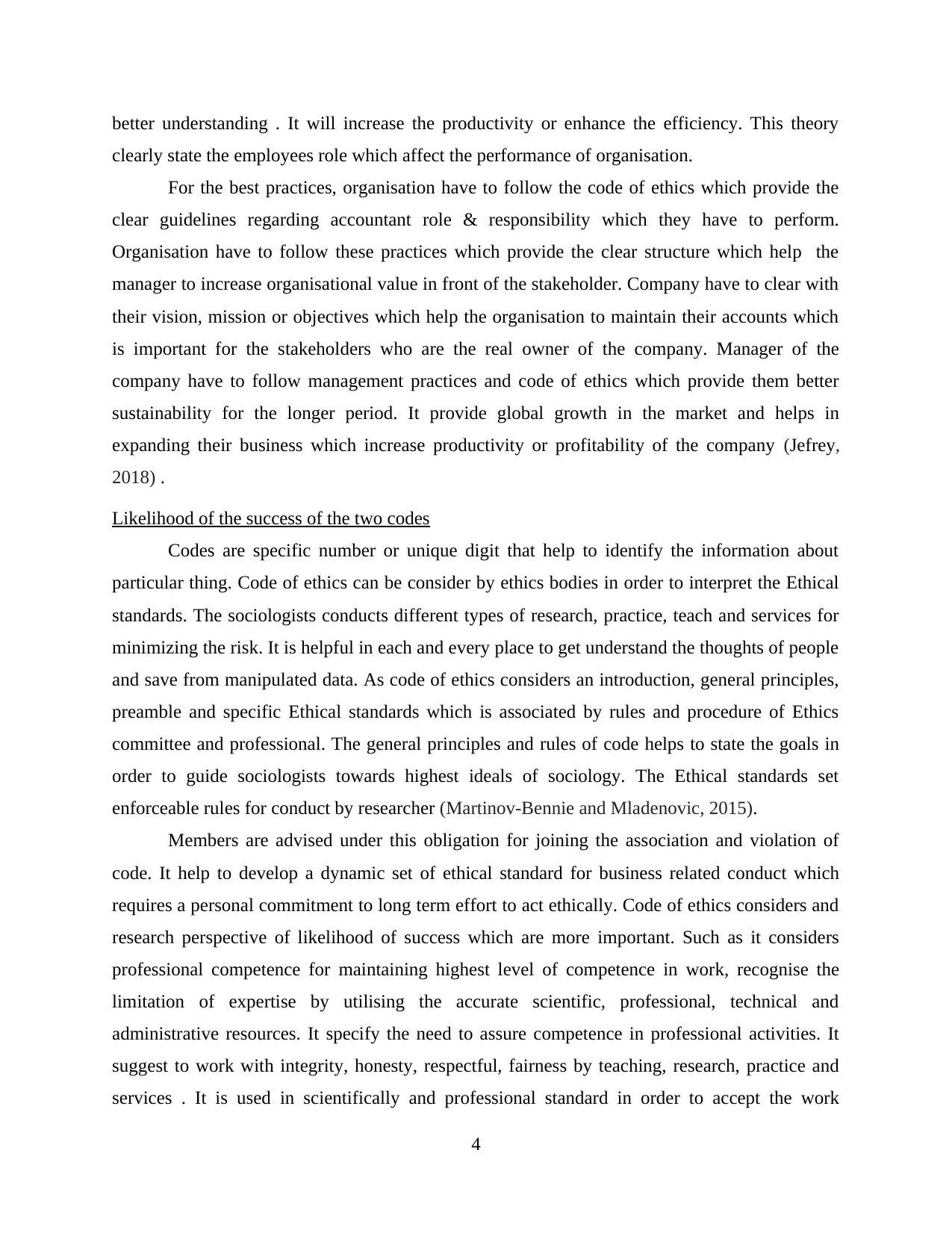
better understanding . It will increase the productivity or enhance the efficiency. This theory
clearly state the employees role which affect the performance of organisation.
For the best practices, organisation have to follow the code of ethics which provide the
clear guidelines regarding accountant role & responsibility which they have to perform.
Organisation have to follow these practices which provide the clear structure which help the
manager to increase organisational value in front of the stakeholder. Company have to clear with
their vision, mission or objectives which help the organisation to maintain their accounts which
is important for the stakeholders who are the real owner of the company. Manager of the
company have to follow management practices and code of ethics which provide them better
sustainability for the longer period. It provide global growth in the market and helps in
expanding their business which increase productivity or profitability of the company (Jefrey,
2018) .
Likelihood of the success of the two codes
Codes are specific number or unique digit that help to identify the information about
particular thing. Code of ethics can be consider by ethics bodies in order to interpret the Ethical
standards. The sociologists conducts different types of research, practice, teach and services for
minimizing the risk. It is helpful in each and every place to get understand the thoughts of people
and save from manipulated data. As code of ethics considers an introduction, general principles,
preamble and specific Ethical standards which is associated by rules and procedure of Ethics
committee and professional. The general principles and rules of code helps to state the goals in
order to guide sociologists towards highest ideals of sociology. The Ethical standards set
enforceable rules for conduct by researcher (Martinov-Bennie and Mladenovic, 2015).
Members are advised under this obligation for joining the association and violation of
code. It help to develop a dynamic set of ethical standard for business related conduct which
requires a personal commitment to long term effort to act ethically. Code of ethics considers and
research perspective of likelihood of success which are more important. Such as it considers
professional competence for maintaining highest level of competence in work, recognise the
limitation of expertise by utilising the accurate scientific, professional, technical and
administrative resources. It specify the need to assure competence in professional activities. It
suggest to work with integrity, honesty, respectful, fairness by teaching, research, practice and
services . It is used in scientifically and professional standard in order to accept the work
4
clearly state the employees role which affect the performance of organisation.
For the best practices, organisation have to follow the code of ethics which provide the
clear guidelines regarding accountant role & responsibility which they have to perform.
Organisation have to follow these practices which provide the clear structure which help the
manager to increase organisational value in front of the stakeholder. Company have to clear with
their vision, mission or objectives which help the organisation to maintain their accounts which
is important for the stakeholders who are the real owner of the company. Manager of the
company have to follow management practices and code of ethics which provide them better
sustainability for the longer period. It provide global growth in the market and helps in
expanding their business which increase productivity or profitability of the company (Jefrey,
2018) .
Likelihood of the success of the two codes
Codes are specific number or unique digit that help to identify the information about
particular thing. Code of ethics can be consider by ethics bodies in order to interpret the Ethical
standards. The sociologists conducts different types of research, practice, teach and services for
minimizing the risk. It is helpful in each and every place to get understand the thoughts of people
and save from manipulated data. As code of ethics considers an introduction, general principles,
preamble and specific Ethical standards which is associated by rules and procedure of Ethics
committee and professional. The general principles and rules of code helps to state the goals in
order to guide sociologists towards highest ideals of sociology. The Ethical standards set
enforceable rules for conduct by researcher (Martinov-Bennie and Mladenovic, 2015).
Members are advised under this obligation for joining the association and violation of
code. It help to develop a dynamic set of ethical standard for business related conduct which
requires a personal commitment to long term effort to act ethically. Code of ethics considers and
research perspective of likelihood of success which are more important. Such as it considers
professional competence for maintaining highest level of competence in work, recognise the
limitation of expertise by utilising the accurate scientific, professional, technical and
administrative resources. It specify the need to assure competence in professional activities. It
suggest to work with integrity, honesty, respectful, fairness by teaching, research, practice and
services . It is used in scientifically and professional standard in order to accept the work
4
Paraphrase This Document
Need a fresh take? Get an instant paraphrase of this document with our AI Paraphraser
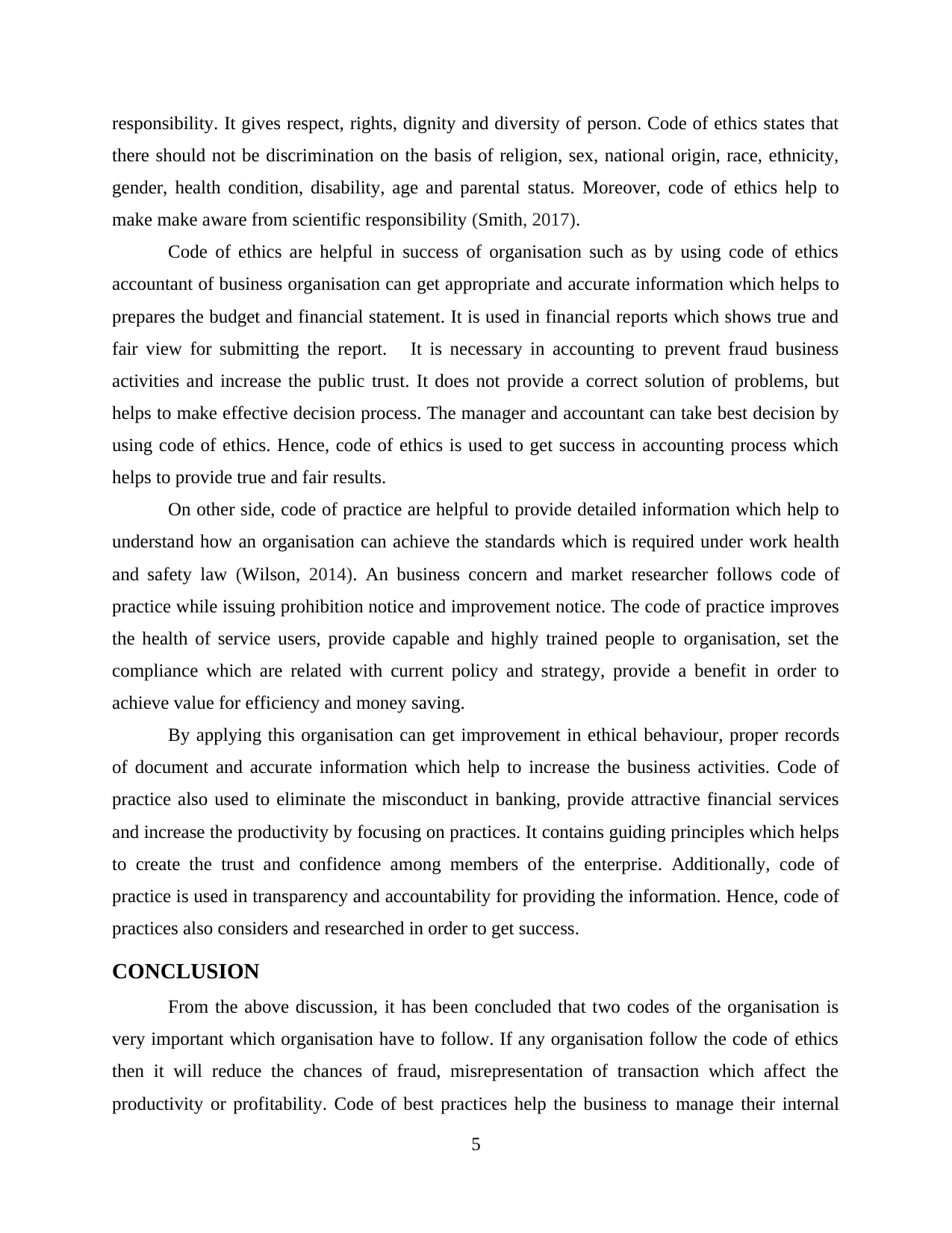
responsibility. It gives respect, rights, dignity and diversity of person. Code of ethics states that
there should not be discrimination on the basis of religion, sex, national origin, race, ethnicity,
gender, health condition, disability, age and parental status. Moreover, code of ethics help to
make make aware from scientific responsibility (Smith, 2017).
Code of ethics are helpful in success of organisation such as by using code of ethics
accountant of business organisation can get appropriate and accurate information which helps to
prepares the budget and financial statement. It is used in financial reports which shows true and
fair view for submitting the report. It is necessary in accounting to prevent fraud business
activities and increase the public trust. It does not provide a correct solution of problems, but
helps to make effective decision process. The manager and accountant can take best decision by
using code of ethics. Hence, code of ethics is used to get success in accounting process which
helps to provide true and fair results.
On other side, code of practice are helpful to provide detailed information which help to
understand how an organisation can achieve the standards which is required under work health
and safety law (Wilson, 2014). An business concern and market researcher follows code of
practice while issuing prohibition notice and improvement notice. The code of practice improves
the health of service users, provide capable and highly trained people to organisation, set the
compliance which are related with current policy and strategy, provide a benefit in order to
achieve value for efficiency and money saving.
By applying this organisation can get improvement in ethical behaviour, proper records
of document and accurate information which help to increase the business activities. Code of
practice also used to eliminate the misconduct in banking, provide attractive financial services
and increase the productivity by focusing on practices. It contains guiding principles which helps
to create the trust and confidence among members of the enterprise. Additionally, code of
practice is used in transparency and accountability for providing the information. Hence, code of
practices also considers and researched in order to get success.
CONCLUSION
From the above discussion, it has been concluded that two codes of the organisation is
very important which organisation have to follow. If any organisation follow the code of ethics
then it will reduce the chances of fraud, misrepresentation of transaction which affect the
productivity or profitability. Code of best practices help the business to manage their internal
5
there should not be discrimination on the basis of religion, sex, national origin, race, ethnicity,
gender, health condition, disability, age and parental status. Moreover, code of ethics help to
make make aware from scientific responsibility (Smith, 2017).
Code of ethics are helpful in success of organisation such as by using code of ethics
accountant of business organisation can get appropriate and accurate information which helps to
prepares the budget and financial statement. It is used in financial reports which shows true and
fair view for submitting the report. It is necessary in accounting to prevent fraud business
activities and increase the public trust. It does not provide a correct solution of problems, but
helps to make effective decision process. The manager and accountant can take best decision by
using code of ethics. Hence, code of ethics is used to get success in accounting process which
helps to provide true and fair results.
On other side, code of practice are helpful to provide detailed information which help to
understand how an organisation can achieve the standards which is required under work health
and safety law (Wilson, 2014). An business concern and market researcher follows code of
practice while issuing prohibition notice and improvement notice. The code of practice improves
the health of service users, provide capable and highly trained people to organisation, set the
compliance which are related with current policy and strategy, provide a benefit in order to
achieve value for efficiency and money saving.
By applying this organisation can get improvement in ethical behaviour, proper records
of document and accurate information which help to increase the business activities. Code of
practice also used to eliminate the misconduct in banking, provide attractive financial services
and increase the productivity by focusing on practices. It contains guiding principles which helps
to create the trust and confidence among members of the enterprise. Additionally, code of
practice is used in transparency and accountability for providing the information. Hence, code of
practices also considers and researched in order to get success.
CONCLUSION
From the above discussion, it has been concluded that two codes of the organisation is
very important which organisation have to follow. If any organisation follow the code of ethics
then it will reduce the chances of fraud, misrepresentation of transaction which affect the
productivity or profitability. Code of best practices help the business to manage their internal
5
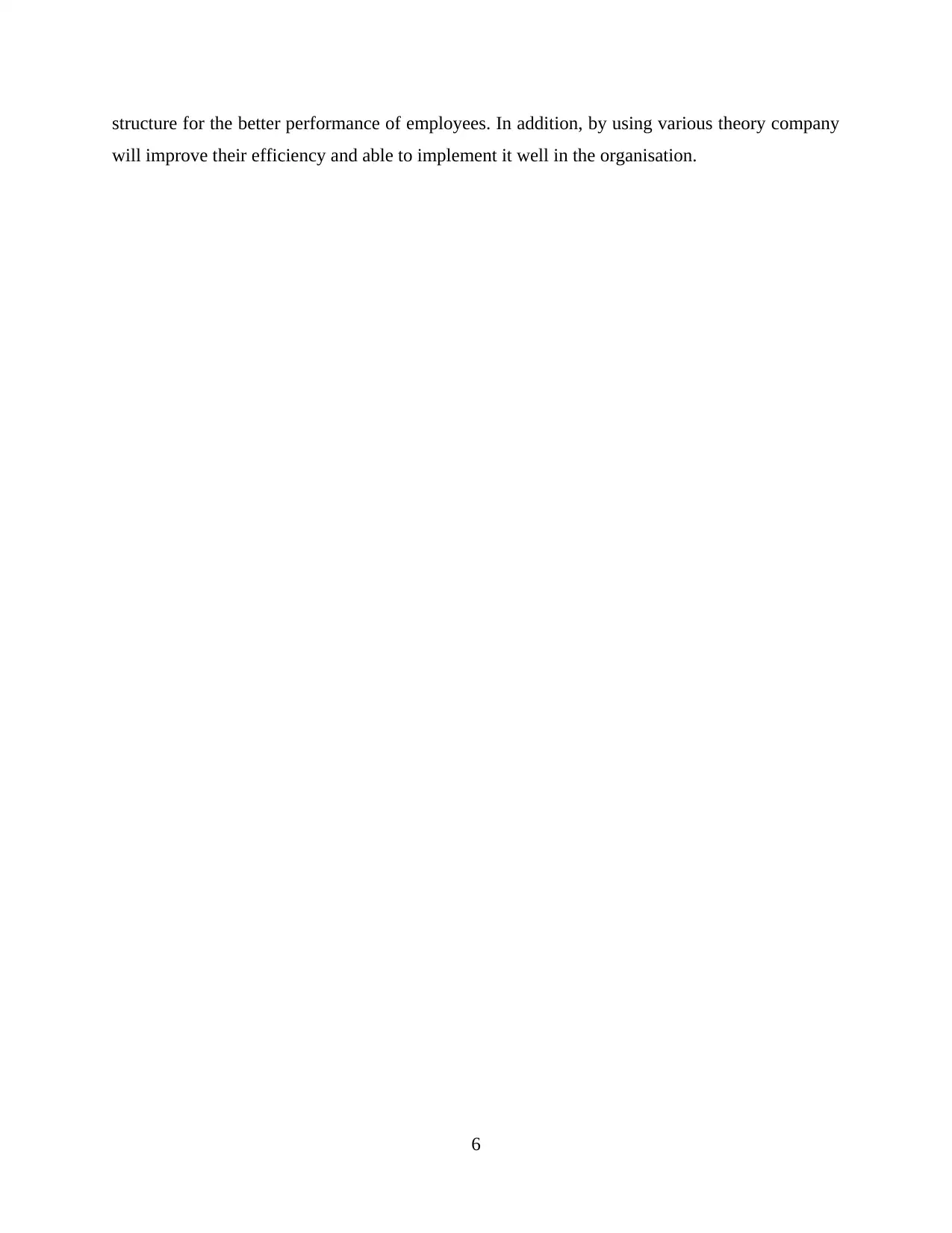
structure for the better performance of employees. In addition, by using various theory company
will improve their efficiency and able to implement it well in the organisation.
6
will improve their efficiency and able to implement it well in the organisation.
6
⊘ This is a preview!⊘
Do you want full access?
Subscribe today to unlock all pages.

Trusted by 1+ million students worldwide
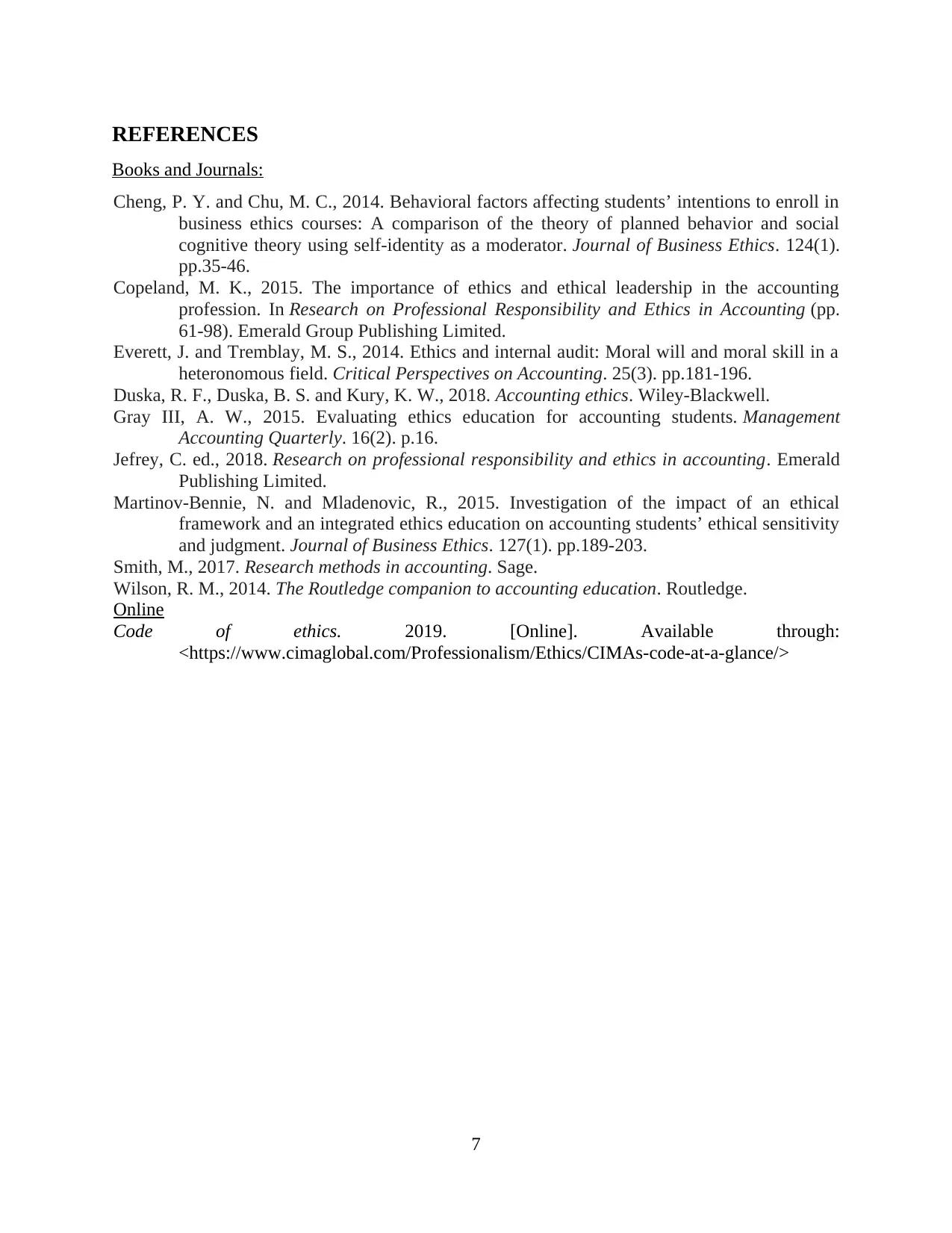
REFERENCES
Books and Journals:
Cheng, P. Y. and Chu, M. C., 2014. Behavioral factors affecting students’ intentions to enroll in
business ethics courses: A comparison of the theory of planned behavior and social
cognitive theory using self-identity as a moderator. Journal of Business Ethics. 124(1).
pp.35-46.
Copeland, M. K., 2015. The importance of ethics and ethical leadership in the accounting
profession. In Research on Professional Responsibility and Ethics in Accounting (pp.
61-98). Emerald Group Publishing Limited.
Everett, J. and Tremblay, M. S., 2014. Ethics and internal audit: Moral will and moral skill in a
heteronomous field. Critical Perspectives on Accounting. 25(3). pp.181-196.
Duska, R. F., Duska, B. S. and Kury, K. W., 2018. Accounting ethics. Wiley-Blackwell.
Gray III, A. W., 2015. Evaluating ethics education for accounting students. Management
Accounting Quarterly. 16(2). p.16.
Jefrey, C. ed., 2018. Research on professional responsibility and ethics in accounting. Emerald
Publishing Limited.
Martinov-Bennie, N. and Mladenovic, R., 2015. Investigation of the impact of an ethical
framework and an integrated ethics education on accounting students’ ethical sensitivity
and judgment. Journal of Business Ethics. 127(1). pp.189-203.
Smith, M., 2017. Research methods in accounting. Sage.
Wilson, R. M., 2014. The Routledge companion to accounting education. Routledge.
Online
Code of ethics. 2019. [Online]. Available through:
<https://www.cimaglobal.com/Professionalism/Ethics/CIMAs-code-at-a-glance/>
7
Books and Journals:
Cheng, P. Y. and Chu, M. C., 2014. Behavioral factors affecting students’ intentions to enroll in
business ethics courses: A comparison of the theory of planned behavior and social
cognitive theory using self-identity as a moderator. Journal of Business Ethics. 124(1).
pp.35-46.
Copeland, M. K., 2015. The importance of ethics and ethical leadership in the accounting
profession. In Research on Professional Responsibility and Ethics in Accounting (pp.
61-98). Emerald Group Publishing Limited.
Everett, J. and Tremblay, M. S., 2014. Ethics and internal audit: Moral will and moral skill in a
heteronomous field. Critical Perspectives on Accounting. 25(3). pp.181-196.
Duska, R. F., Duska, B. S. and Kury, K. W., 2018. Accounting ethics. Wiley-Blackwell.
Gray III, A. W., 2015. Evaluating ethics education for accounting students. Management
Accounting Quarterly. 16(2). p.16.
Jefrey, C. ed., 2018. Research on professional responsibility and ethics in accounting. Emerald
Publishing Limited.
Martinov-Bennie, N. and Mladenovic, R., 2015. Investigation of the impact of an ethical
framework and an integrated ethics education on accounting students’ ethical sensitivity
and judgment. Journal of Business Ethics. 127(1). pp.189-203.
Smith, M., 2017. Research methods in accounting. Sage.
Wilson, R. M., 2014. The Routledge companion to accounting education. Routledge.
Online
Code of ethics. 2019. [Online]. Available through:
<https://www.cimaglobal.com/Professionalism/Ethics/CIMAs-code-at-a-glance/>
7
1 out of 10
Related Documents
Your All-in-One AI-Powered Toolkit for Academic Success.
+13062052269
info@desklib.com
Available 24*7 on WhatsApp / Email
![[object Object]](/_next/static/media/star-bottom.7253800d.svg)
Unlock your academic potential
Copyright © 2020–2026 A2Z Services. All Rights Reserved. Developed and managed by ZUCOL.




